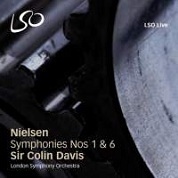These are for the most part very good performances. The First Symphony fares best. The outer movements have the necessary guts in terms of accentuation, at nicely propulsive tempos. The solo winds (clarinet especially) also play quite well–critical in Nielsen’s music. My only quibble concerns the quasi-scherzo third movement, which seems a trifle too quick and lacking in charm. This deficit turns out to be prophetic: the Sixth is well played, but simply not weird enough. The opening lacks humor, and the dissonant climax, which ought to be shocking, is too soft-edged. It just may be that conductor Colin Davis takes the whole thing too seriously, or perhaps he just doesn’t get the music’s irony. This is certainly true of the second-movement Humoreske, which should sound slightly insane, or the wacky waltz in the finale, which goes at a swift tempo that comes across as though Davis were a touch embarrassed at the direction the music is going. Don’t get me wrong: there’s nothing unmusical or “wrong” about the interpretation, or the playing for that matter; but it doesn’t delve into the music as deeply as others have. Not bad, then, and in places quite good, but not great.
































